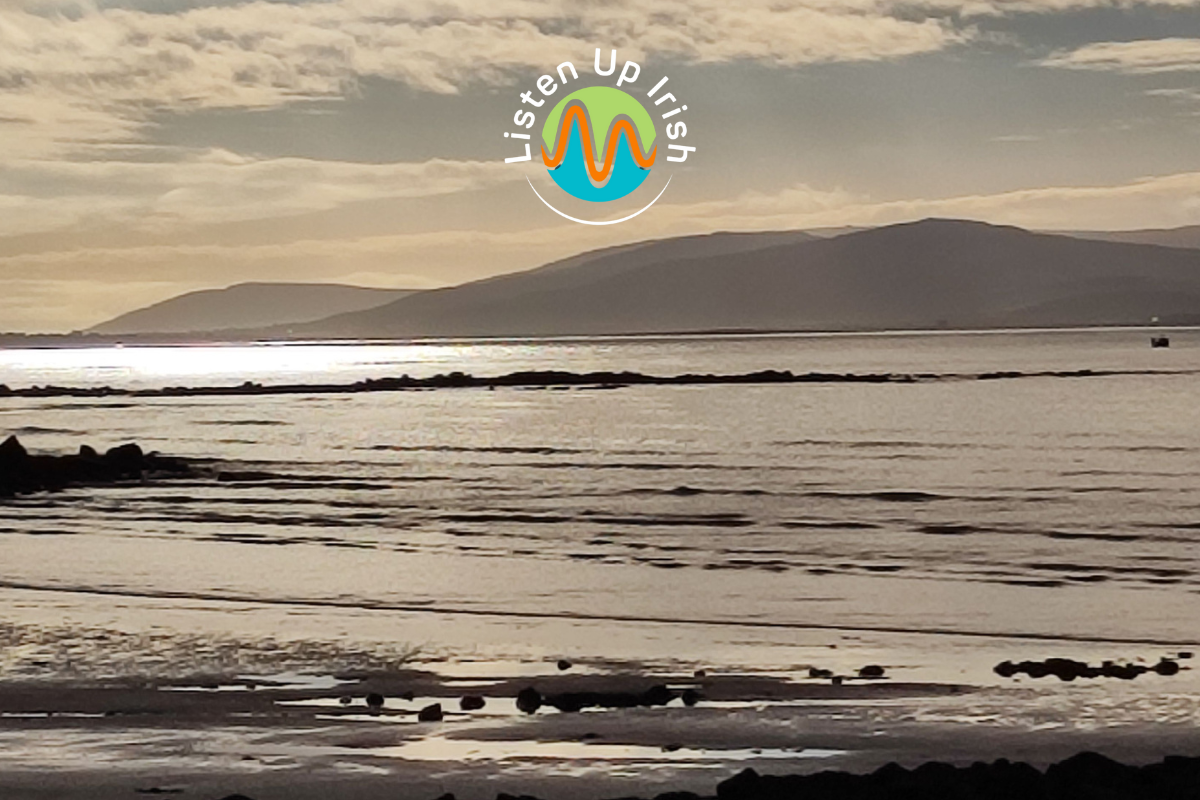Get a qualification in Irish / TEG A2 and B1
The short video above is a sample lesson from the All About Irish TEG A2 preparatory course. Read on to find our more about the TEG certification system in general; and to learn about the All About Irish TEG preparatory courses for both A2 (upper beginner/lower intermediate) and B1 levels (intermediate).
Find out more about the TEG A2 course
Find out more about the TEG B1 course
What exactly is TEG?
TEG stands for 'Teastas Eorpach sa Ghaeilge' (The European Certificate in Irish) and is a system of certification of proficiency in the Irish language for adult learners. It is a comprehensive graded system that allows adult learners to take an exam in Irish at 5 different levels of proficiency. The TEG system is based on the European wide CEFR, and is administered by the Centre for Irish Language at Maynooth University, Ireland.
Find out more about the TEG A2 course
Find out more about the TEG B1 course
Why would I choose to sit an exam in Irish?
A defined and realistic goal
It can be more difficult as an adult learner to find the time and discipline to devote to learning Irish in order to reach a high standard of fluency. Having the set goal of an exam to prepare for operates as a great incentive to put the time in.
A sense of achievement
Working your way up through the different levels in the TEG system is very satisfying and will boost your confidence in your ability to communicate in Irish. The TEG system is a comprehensive graded system which provides a very clear learning pathway.
A nationally recognised standard
The TEG exam is a nationally recognised certificate of proficiency in the Irish language. It is recognised within the civil service and by employers and recruiters. The qualification on your CV will stand to you in any job in which an ability with the Irish language is required, and might just give you the edge over another applicant!
Speaking Skills
The TEG syllabus (at each level) places a large emphasis on speaking ability, as 35% of the overall marks are awarded for this part of the exam. The monthly speaking session (or 'ciorcal comhrá') in my TEG preparatory courses will be used to prepare for the oral part of the course and will provide an opportunity for you to gain confidence in your speaking ability in Irish. (These speaking sessions are in addition to the monthly live lesson).
Listening and Comprehension Skills
One of the interesting features of the TEG syllabus is that it incorporates aspects of all of the main dialects. While you may already have decided to focus more on one particular dialect (or not) - the preparation for this course will involve some contact with all 3 dialects. Anyone wishing to become proficient in Irish needs to have some understanding of the differences between the dialects, and the TEG syllabus promotes this.
Guaranteed Language Progression
Your Irish competency is guaranteed to progress in preparing for a TEG exam, regardless of whether or not you ultimately decide to sit the exam. If you take an All About Irish TEG preparatory course you will be learning in community with other learners, all preparing for the same exam and there to help each other along the journey!
Teacher training requirements
For anyone wishing to take the Professional Masters in Education to retrain as a primary school teacher a mark of 65% or higher is required in the B1 oral exam (along with at least H4 in the Leaving Cert). For anyone without a Leaving Cert in Irish then 50% in the full B2 exam will be required in order to be admitted.
Click here to read more about the TEG requirement for entry to the PME (Primary Teaching)
Now, are you ready for another acronym...?
What is CEFR?
CEFR stands for 'Common European Framework of Reference for Languages'. The common framework was devised by the Council of Europe in 2001, and is essentially an international standard for describing language ability. The Framework divides ability in a language into 6 levels, from A1 (beginner) to C2 (mastery). The TEG system is based on this international CEFR grading system for language learning.

A description of the different levels
A1: Can understand and use very frequently used everyday expressions as well as simple phrases to meet everyday needs. They can introduce themselves and can ask and answer simple questions about personal details, e.g. where they live. They can interact in a simple way provided that the other person speaks slowly and clearly and is prepared to cooperate.
A2: Can understand and speak about everyday tasks, past events and future plans. They can use frequently used expressions and vocabulary related to the 14 topics of the TEG syllabus (e.g. shopping; pastimes etc.). They can describe in simple terms matters related to the past; future plans and discuss immediate needs and wants.
B1: An independent user of the language who has the necessary fluency to communicate without effort with native speakers. They can understand the main points of clear text in standard language if they are about familiar topics; they can cope with most of the situations that may arise in an area where the language is in use; they can describe experiences, events, wishes and aspirations as well as justify opinions and explain plans.
B2: An independent user who can understand the main ideas of complex text on both concrete and abstract topics, including on technical matters. Can interact with a degree of fluency and spontaneity that makes regular interactions with native speakers quite possible without undue strain for either party.
C1: A proficient user of the language who can perform complex tasks related to work and study; and who can express themselves easily and fluently without much obvious searching for the right expression. They can use the language flexibly and effectively for social, academic and professional purposes.
C2: An advanced proficient user who can understand with ease practically everything they read or hear. They can summarise information and arguments from different spoken and written sources, and present themselves coherently, concisely and fluently, and can easily differentiate subtle nuances of meaning. (Note: TEG is not offered at C2 level).
What skills are tested in a TEG exam and when does it take place?
Speaking, listening, reading and writing skills in Irish are all tested during a TEG exam. The oral part of the exam accounts for 35% of the total marks at A2 level; and 30% of the marks at B1 level. The oral part of the exam lasts approximately 15 minutes; the listening/reading/writing sections of the exam take 2 hours. The exams are held at various centres around Ireland and abroad in May/June each year.
(Special sittings for the B1 oral exam are also held in January/February each year. These sittings are specifically for applicants to the Postgraduate Master of Education (Primary Teaching)).
The current fee to sit the exam is €120 (you can ask if your employer is willing to subsidise the cost). All About Irish TEG courses are based entirely on the TEG syllabus and are the optimal way to prepare for a TEG exam. Courses combine audio, video, sample questions, quizzes, worksheets and live elements.
The A2 exam is usually held in June; the B1 exam in May. Dates for the 2026 exams are not yet available, and are usually made available in January each year.
More information on All About Irish preparatory courses
Find out more about the TEG A2 course
Find out more about the TEG B1 course
Included in each course:
- 6 x live facilitated ciorcal comhrá sessions (+ live lessons with Premium version)
- An explanation video covering vocabulary for each of the 14 topics on the TEG A2 syllabus / each of the 15 topics on the TEG B1 syllabus
- The teaching materials from the TEG site itself are contained within the course
- Audio recordings of conversations relating to each of the syllabus topics, in video format, so that reading and listening can happen at the same time. These recordings contain samples of each of the three main dialects
- A full review of the two sample papers on the TEG site
- A module dedicated to preparation for the oral part of the exam
- A module dedicated to common mistakes and exam tips
- Comprehensive downloadable course booklet and worksheets
- Quizzes for each topic within the course
- Worksheets with answers for each topic within the course
- Monthly homework assignments (Premium version)
- B1 course only: 2 Masterclasses devoted solely to the B1 oral examination
The 14 topics on the A2 syllabus:
- Ócáidí sóisialta / social occasions
- An teaghlach / the household
- Caitheamh aimsire / pastimes
- Taisteal laethúil / daily travel
- Cúrsaí oibre / work matters
- Ag labhairt faoin deireadh seachtaine / talking about the weekend
- Bia agus deoch / food and drink
- Sláinte agus tinneas / health and sickness
- Cur síos ar dhaoine / describing people
- Éadaí agus siopadóireacht / Clothes and shopping
- Ag pleanáil laethanta saoire / planning holidays
- Treoracha, suíomh agus gluaiseacht / directions, location and movement
- Garanna agus cead / favours and permission
- Ag déanamh socruithe / making arrangements
The 15 topics on the B1 syllabus:
- Cúlra agus áit chónaithe / background and where you live
- An teaghlach / the household
- An teach / the house
- Cúrsaí oibre / work matters
- Taisteal agus laethanta saoire / travel and holidays
- Cúrsaí oideachais / education matters
- Caitheamh aimsire / spórt agus ceol)
- Bia agus deoch / food and drink
- An saol laethúil / daily life
- Cúrsaí siopadóireachta / shopping
- An duine / the person
- Coinní agus socruithe / appointments and arrangements
- Ag foghlaim teangacha / learning languages
- Caitheamh aimsire 2 / pastimes 2
- Ag labhairt faoin todhchaí / speaking about the future
Find out more about the TEG A2 course
Find out more about the TEG B1 course
FAQ
Why would I take A TEG course if I don't want a qualification?
All About Irish TEG courses are run over 6 months with a deadline - the TEG exam. This means that even if you don't want to sit the exam yourself you will be carried along by the energy of the others in the group, all working towards the exam deadline. This momentum of a structured programme over the course of 6 months benefits everyone - both those who decide to sit the exam and those who don't plan on sitting the exam.
Should I take this course if I do not intend to sit a TEG exam?
Yes! These courses are a great way to learn Irish. The courses cover many topics of general everyday communication and will benefit anyone learning Irish, regardless of whether or not they ultimately decide to take a TEG exam.
Entries for the exams don't open until Spring 2026 in any case so there is no need to make a decision one way or the other until then!
How do I know which level I should do?
The A2 level course is best suited for anyone at upper beginner/lower intermediate level. You have already taken some beginner courses, or you did some Irish many years ago but it's very rusty. The B1 level course is for someone who is at intermediate level.
If you're not sure which level is the right one for you send me a message here letting me know what experience you have had with Irish to date. We can also arrange a quick zoom call if that is necessary.
If you start either course and find it is too easy or too difficult you can switch levels to whatever level would be more appropriate for you.
I am a total beginner, is the A2 course suitable for me?
No, the A2 course is not suitable for a total beginner. I suggest instead that you take my Beginner course, and follow that up with my Beyond Beginner courses.
Can I do the B1 exam if I haven't done the A2 exam?
Yes, there is no requirement to have sat the A2 exam before sitting the B1 exam.
Similarly, there is no requirement to have taken the All About Irish A2 course before doing the B1 course. Both courses are entirely standalone, and the choice of which one to do simply depends on your current level of Irish.
What is the difference between the A2 course and the B1 course?
The topics covered in both courses are broadly similar, however the range of vocabulary and the complexity of the language and grammar used is at a higher level in the B1 course. The layout for each course is similar; and both include 12 live sessions (6 x live lesson; 6 x ciorcal comhrá).
The B1 course includes an additional two live masterclasses devoted entirely to the oral part of the examination. These masterclasses will be offered in January/February 2026 and the exact dates will be made available once the exam dates have been released.
What exactly will I learn in the A2 course?
In the A2 course you will learn how to speak about everyday tasks, past events and future plans. You will become familiar with frequently used expressions and vocabulary related to all 14 topics within the TEG A2 syllabus (topics include: social occasions; pastimes; work; health and illness and more). You will be able to read short simple texts relating to each of the 14 topics, and you will understand short conversations with everyday vocabulary where the speaker speaks clearly and without great speed. You will be able to describe in simple terms, in both speech and writing, matters related to the past, future plans and immediate needs and wants. You will also get a solid grounding in the basic structures of the language including verb tenses and much more. Points of grammar are explained in everyday simple language as they arise within each topic.
What exactly will I learn in the B1 course?
You will develop and expand your vocabulary and knowledge of the language to the point where you will become an independent user of the language who has the necessary fluency to communicate without effort with native speakers. You will be able to speak with ease and fluency about each of the 15 topics on the TEG B1 syllabus (topics include: work matters; education; learning languages and more). You will be able to describe experiences, events, wish and aspirations as well as justify opinions and explain plans. You will be able to understand the main points of clear text in standard language about familiar topics. You will learn more about the main differences between the three main dialects, and you will become more familiar with the structure of the language. As in the A2 course points of grammar are explained in everyday simple language as they arise within each topic.
How often a year are the exams held?
The A2 exams are held just once per year; in 2025 the exam date was 8th June.
The B1 exam is held in mid May/early June each year.
Special sittings of the B1 exam (oral part only) are held in January/February each year. These dates are allocated to people who intend to apply for the PME (Primary Teaching) only.
If I fail the exam when can I repeat it?
If you fail the exam you may ask for a recheck, however you will have to wait until the following year to resit the exam.
How will a TEG qualification help me?
A TEG certificate is international recognition of a certain level of proficiency in another language. The civil service in Ireland is increasingly moving towards recognition of TEG certification, and anyone going for interview for a state job will be given bonus points for listing TEG certification on their cv. Certain private sector occupations. particularly in media and tourism will also look very favourably on the holder of a TEG certificate.
Outside of Ireland a TEG certificate indicates that a person speaks another language to a certain level, and is therefore adept at learning languages, which may favourably influence an application for a particular position.
And of course the TEG certificate can be used as a mark of achievement and displayed with pride in the office or home!
Is there a fee to sit a TEG exam?
Yes, there is a fee of €120 to sit a TEG exam. That fee is not included in the course price.
Can I take the exam online?
No, it is not currently possible to take a TEG exam online, and you must attend at an official exam centre.
Many of my previous students have used the TEG exam as the perfect excuse for a trip to Ireland!
Are the TEG exams focused on a specific dialect?
The TEG system is designed to encourage learners to become familiar with all three of the main dialects of Irish: Ulster, Munster and Connacht. The listening part of the exam reflects this and samples of all three dialects are incorporated into the exam questions. The All About Irish TEG courses, at both A2 and B1 levels, ensure that exposure is given to all three dialects, and that the main differences between the dialects are highlighted throughout the course. While you may be more comfortable speaking in one dialect over another by the end of the TEG courses you will be familiar and comfortable with all three dialects.
What is the refund policy?
There is a full 14 day no questions asked refund policy, on condition that none of the course materials have been downloaded.
How do I access my course?
You can access your course via the All About Irish website (click on ‘Log In’) or through the All About Irish app. If you have any difficulty accessing your course, please email me immediately: [email protected]
How long will I have access to my course?
Full access is guaranteed for a minimum of twelve months. This will be extended free of charge for as long as I decide to make a course available, however this is ultimately at my discretion.
What if I have questions during the course?
You can ask questions under any of the lessons within the course; and during the live lessons and monthly speaking practice sessions. I monitor these questions and generally try to answer within 24 hours, although at weekend and during holiday periods the time taken to answer may be longer.
Do I need to pass a TEG exam to apply for PME (Primary Teaching)?
A result of 65% in the oral part of the B1 exam is a pre-requisite for entry to the Postgraduate Master of Education (Primary Teaching) at all of the four state-funded institutions. It may also be used to apply for the PME (Primary Teaching) at Hibernia College, in lieu of doing an interview in Irish.
Click here to read more about TEG requirements for the PME (Primary Teaching).
How do I register for a course?
Find out more about the TEG A2 course
Find out more about the TEG B1 course
Aon cheist? Any questions?
I hope that the above has answered your main questions about the TEG system. If you have any more questions at all, or if you are wondering which level would be the right one for you, please feel free to contact me here. If you think that getting a state recognised certificate for your proficiency in Irish might be of interest then the All About Irish preparatory courses will help you achieve that goal for both A2 and B1 levels.





